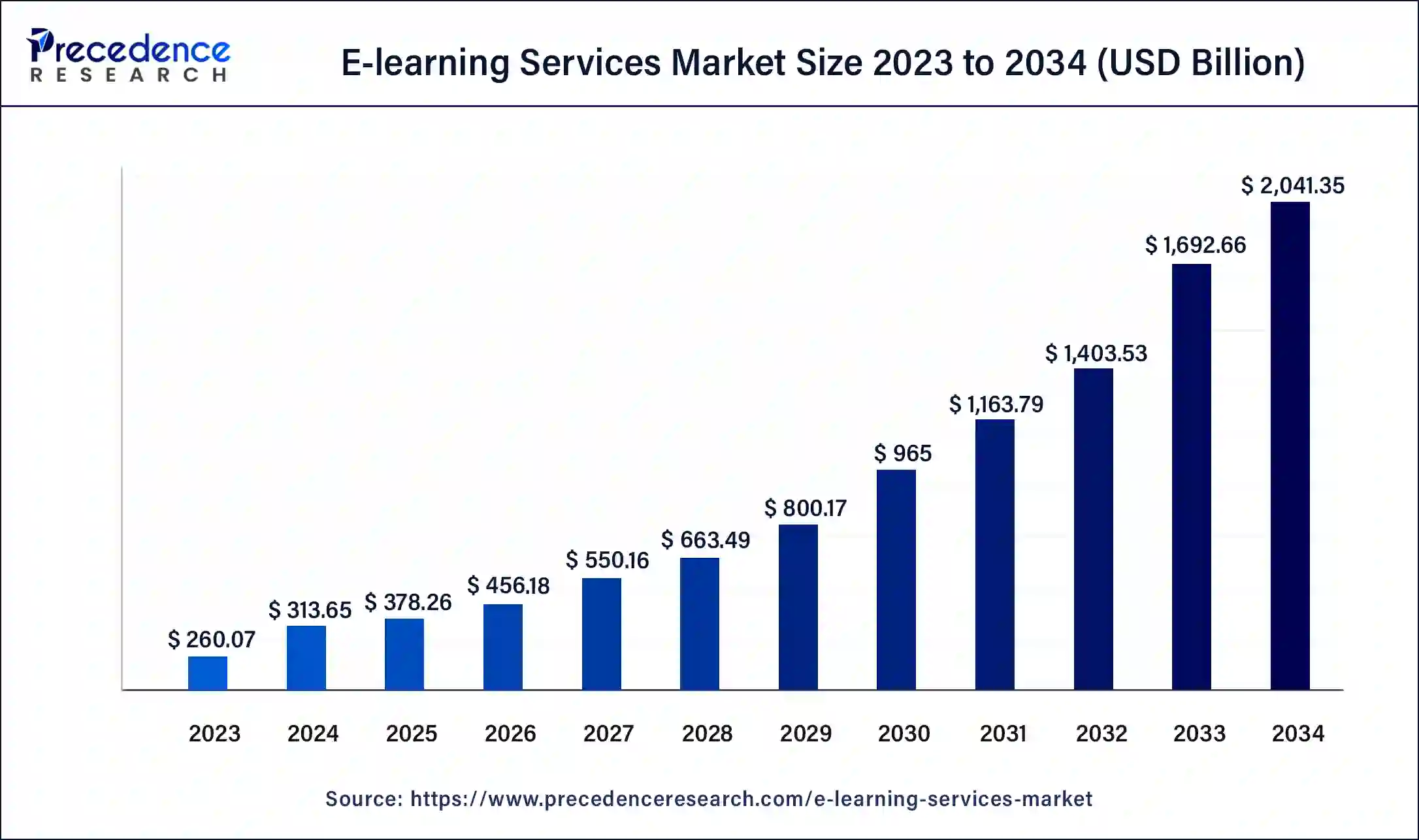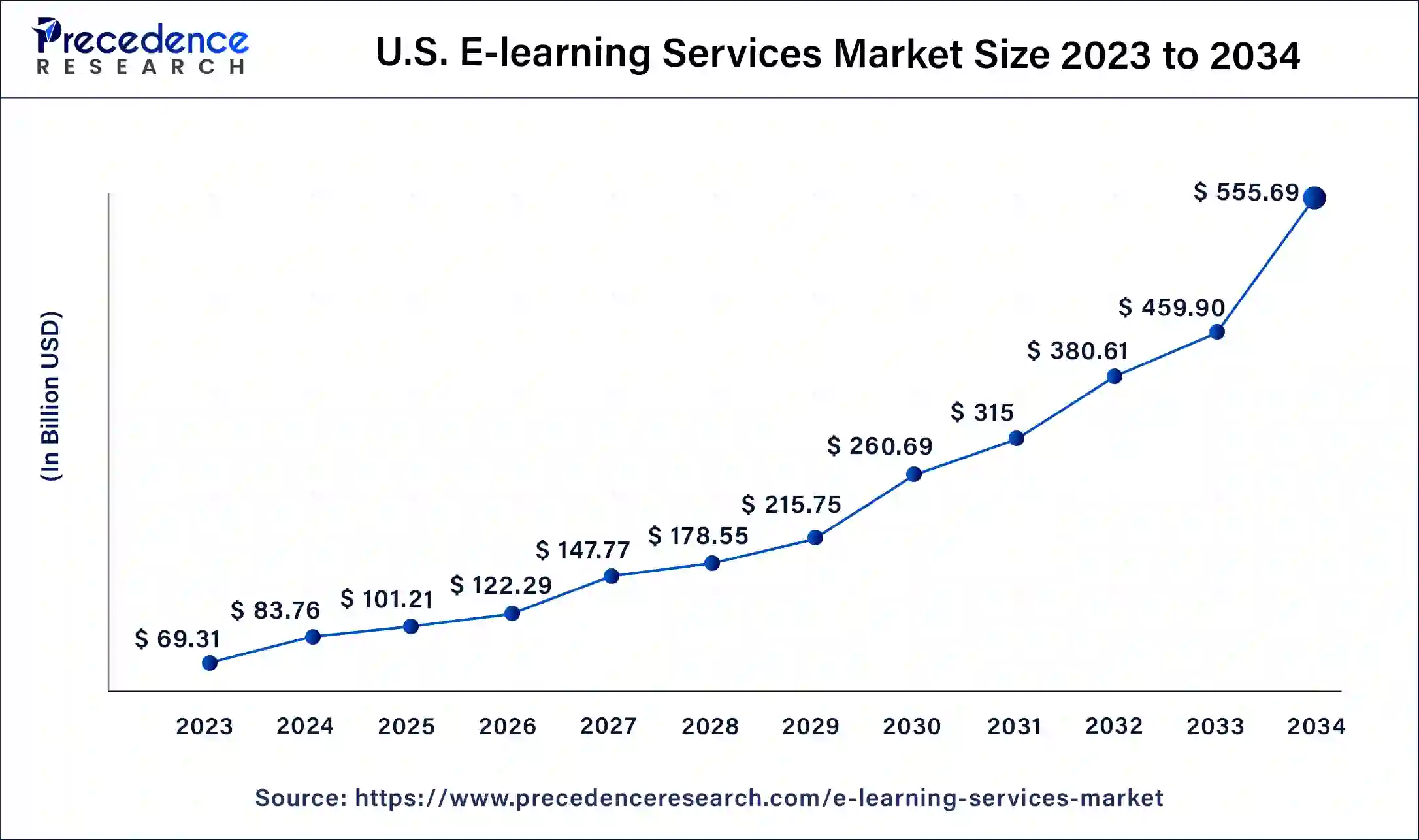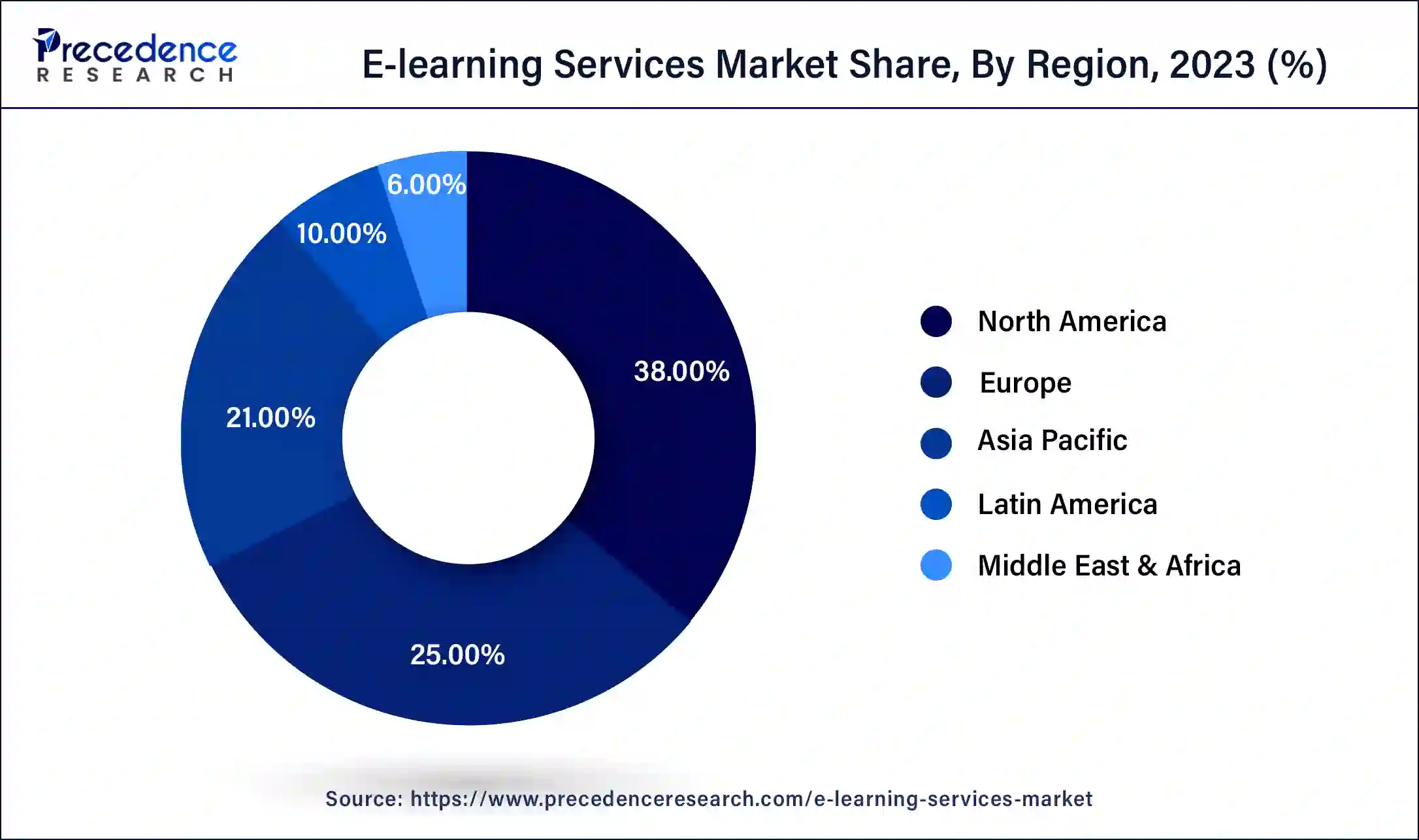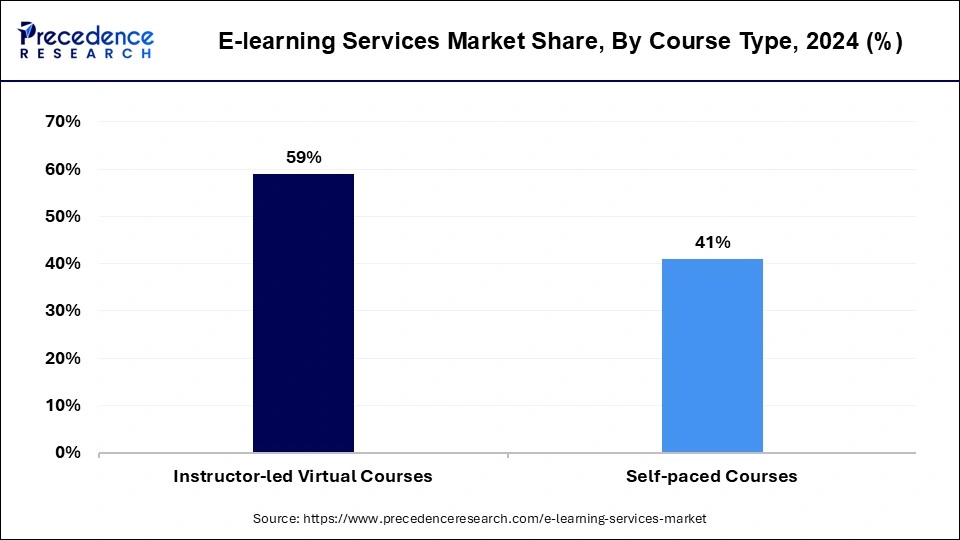February 2025
E-learning Services Market (By Type: Custom e-Learning, Responsive e-Learning, Micro e-Learning, Translation & Localization, Game-Based Learning, Rapid e-Learning; By Courses: Self-paced Courses, Instructor-led Virtual Courses; By Learning Method: Blended Learning, Mobile Learning, Virtual Classrooms, Simulation; By Technology; By End-use) - Global Industry Analysis, Size, Share, Growth, Trends, Regional Outlook, and Forecast 2024-2034
The global E-learning services market size was USD 260.07 billion in 2023, calculated at USD 313.65 billion in 2024, and is expected to reach around USD 2,041.35 billion by 2034. The market is expanding at a solid CAGR of 20.6% over the forecast period 2024 to 2034. The North America quantum computing market size reached USD 98.83 billion in 2023.

The U.S. E-learning services market size was estimated at USD 69.31 billion in 2023 and is predicted to be worth around USD 555.69 billion by 2034, at a CAGR of 20.8% from 2024 to 2034.

North America currently held the largest market share of 38% in the e-learning services market in 2023 and is expected to maintain its dominance in the forecast period. This trend is driven by the increasing demand for e-learning services to cater to the growing adoption of digital technologies in education and training. Individuals are turning to e-learning platforms to enhance their knowledge and skills, while educational institutions, government organizations, and corporations are utilizing these services to deliver courses and training programs to students and employees. The platform offers specialized courses tailored to stakeholders in various industries, including specifiers, distributors, contractors, converters/fabricators, and OEM customers.

Asia Pacific is forecasted to experience the highest CAGR of 20.9% during the forecast period. E-learning has emerged as a vital tool for digital upskilling, enabling individuals to acquire and improve their digital competencies. The COVID-19 pandemic accelerated the adoption of e-learning, making it essential for individuals across industries to enhance their digital skills. In response to the pandemic's challenges, companies focused on hiring individuals based on their skill sets.
Microsoft reported that nearly 6 million individuals in Asia Pacific utilized various opportunities and resources provided by organizations like Microsoft to enhance their digital capabilities during the pandemic. This emphasis on digital upskilling is expected to drive the growth of the e-learning market in Asia Pacific in the post-pandemic era.
The e-learning services market encompasses the delivery of education and training through electronic technologies. Referred to by various names such as internet learning, distance learning, and online learning, e-learning has applications in both corporate training and academic learning settings. E-learning leverages various technologies such as learning management systems (LMS), video conferencing, interactive simulations, and multimedia resources to create engaging and effective learning experiences. It enables learners to progress at their own pace, access content anytime, anywhere, and engage in collaborative activities with peers and instructors.
Overall, e-learning services offer a flexible, scalable, and accessible approach to education and training, catering to the evolving needs of both corporate and academic learners in today's digital age. The growth of the e-learning services market is primarily fueled by the increasing demand for cost-efficient training and learning solutions in both corporate and academic sectors. Managing and storing large volumes of course content has become a challenge for these sectors.
The electronic delivery of content offers a solution by enabling them to store and manage their course materials online via websites or applications. The rising adoption of cloud-based platforms in the e-learning services market provides added flexibility in content storage, accessibility, and processing. Cloud learning platforms offer several advantages including remote access, enhanced security, data backup, and cost-effectiveness. Moreover, this technology facilitates easy content delivery and student access compared to traditional reliance on books and course materials.
E-learning Services Market Data and Statistics
| Report Coverage | Details |
| Growth Rate from 2024 to 2034 | CAGR of 20.6% |
| Global Market Size in 2023 | USD 260.07 Billion |
| Global Market Size in 2024 | USD 313.65 Billion |
| Global Market Size by 2034 | USD 2,041.35 Billion |
| U.S. Market Size in 2023 | USD 69.31 Billion |
| U.S. Market Size by 2034 | USD 555.69 Billion |
| Base Year | 2023 |
| Forecast Period | 2024 to 2034 |
| Segments Covered | By Type, By Course, By Learning Method, By Technology, and By End-use |
| Regions Covered | North America, Europe, Asia-Pacific, Latin America, and Middle East & Africa |
Widespread use of smartphones and development of various application-based knowledge platforms
Mobile learning technologies are experiencing rapid growth within the e-learning services market, driven by the widespread use of smartphones. This trend has led to the development of various application-based knowledge platforms, allowing users to access real-time insights on diverse topics directly from their smartphones. Educational institutions, including universities and schools, are also leveraging mobile-based applications to provide students with convenient access to missed lectures and other learning resources through student portals.
In the corporate sector, several prominent mobile applications such as Udemy, Skill Pill, DesignJot, and BoostHQ are widely used to facilitate learning and skill development among employees. Additionally, developers are introducing game-based application platforms designed to engage children through interactive animated videos and pictures, thereby enhancing their logical reasoning skills and IQ levels. These mobile learning technologies offer flexibility and accessibility, enabling users to engage in learning activities anytime and anywhere using their smartphones.
As mobile devices become increasingly integrated into daily life, the demand for mobile learning solutions is expected to continue growing, driving innovation and adoption across various educational and professional settings.
Concerns over data security
One of the major restraints facing the e-learning services market is the digital divide and unequal access to technology and internet connectivity. Despite the widespread adoption of digital learning platforms, many individuals, particularly in rural or underserved areas, lack reliable access to high-speed internet and digital devices. This disparity in access limits the effectiveness of e-learning initiatives and prevents certain segments of the population from fully participating in online education Moreover, issues related to digital literacy and technological infrastructure further exacerbate the digital divide.
Individuals who are not familiar with technology or lack the necessary skills to navigate online platforms may struggle to engage with eLearning content effectively. Hence, addressing these challenges related to digital access, literacy, infrastructure, and data security is crucial for unlocking the full potential of eLearning services and promoting equitable access to education for all.
Growing demand for soundproof transportation
One of the significant growth opportunities in the E-Learning services market lies in the expansion of personalized learning experiences through the use of artificial intelligence (AI) and machine learning (ML) technologies. These advanced technologies enable eLearning platforms to analyze user data, preferences, and learning patterns to tailor content and recommendations to individual learners. By leveraging AI and ML algorithms, eLearning platforms can offer adaptive learning paths that adjust based on each learner's strengths, weaknesses, and pace of learning. This personalized approach enhances learner engagement, comprehension, and retention by delivering content that is relevant and aligned with the learner's needs and learning style.
Furthermore, AI-powered features such as intelligent tutoring systems, virtual mentors, and chatbots provide learners with instant feedback, assistance, and support throughout their learning journey. These interactive and responsive features mimic the guidance and support of human instructors, thereby enhancing the overall learning experience. Another growth opportunity lies in the integration of immersive technologies such as virtual reality (VR) and augmented reality (AR) into eLearning platforms. VR and AR technologies enable learners to engage in realistic simulations, virtual labs, and interactive experiences that enhance their understanding of complex concepts and practical skills. Additionally, the increasing demand for microlearning and mobile learning solutions presents a significant growth opportunity for eLearning service providers.
Microlearning involves delivering bite-sized learning modules or content nuggets that are easy to consume and digest, making them ideal for learners with busy schedules or short attention spans. Mobile learning solutions allow learners to access educational content anytime, anywhere, using their smartphones or tablets, thereby increasing accessibility and flexibility. Hence, by embracing advanced technologies, personalizing learning experiences, and catering to evolving learner preferences, the e-learning services market can unlock new growth opportunities and address the diverse needs of learners across different industries and demographics.
The custom e-learning segment held the largest market share of 33% in 2023 and is expected to continue dominating the market in the forecast period. Custom e-learning involves developing tailored educational content and experiences delivered through digital platforms to meet the specific needs and objectives of organizations, groups, or individuals.
Tthe game-based learning segment is projected to witness the highest CAGR during the forecast period. Game-based learning entails creating e-learning experiences that engage learners and motivate them to enhance their skills in a competitive environment. It leverages gamification techniques to foster learning by providing incentives and rewards for skill development. This approach is increasingly applied in workplace training, particularly in compliance, software applications, and communication training, as it encourages active participation and knowledge retention among learners.
The instructor-led virtual courses segment held the largest market share of 59% in 2023. Instructor-Led Training (ILT), whether conducted online or in physical classrooms, involves instructors guiding the learning process. This method includes traditional classroom lectures, interactive workshops, or virtual sessions facilitated via video conferencing tools. ILT encourages interaction and meaningful discussions among learners and instructors, fostering a collaborative learning environment. Many companies and institutions are adopting these e-learning courses to upskill industry professionals.

The self-paced courses segment is expected to witness the highest CAGR of 22.6% during the forecast period. Self-paced learning allows learners to navigate through course materials at their own pace and preferred schedule. Individuals have the flexibility to allocate more or less time to specific lessons or course content according to their preferences. This approach provides a personalized learning experience, enabling learners to tailor their education to their unique needs and interests, which contributes to its anticipated growth in the e-learning market.
The blended learning segment held the largest market share of 37% in 2023 in the e-learning services market. Blended learning combines traditional classroom training with online learning activities, maintaining instructor presence during face-to-face sessions, setting it apart from fully online eLearning.
The simulation segment is projected to experience the CAGR during the forecast period. E-learning simulations enable learners to practice and train for work procedures or routines within a virtual learning environment. These simulations replicate real-world scenarios using multimedia graphics and assets that closely resemble the actual working environment. They offer experiential learning opportunities through hands-on activities, enhancing learner engagement and retention. As a result, many organizations are leveraging e-learning simulations to attract customers and enhance their business offerings.
The cloud computing segment held the largest market share of 38% in the e-learning services market and is expected to maintain its dominance in the forecast period. Cloud computing services encompass software, servers, databases, storage, networking, and analytics delivered over the internet. These solutions enable users to access shared resources and information from any location with internet connectivity, facilitating seamless access to e-learning platforms and resources.
The artificial intelligence segment is projected to witness the highest CAGR during the forecast period. AI has emerged as a transformative technology in the e-learning sector, reshaping how educational content is delivered and personalized to meet individual learner needs. The increasing adoption of AI in e-learning platforms is driven by its potential to improve learning outcomes and offer personalized educational experiences. Many organizations are integrating AI into their platforms to enhance learner engagement and retention rates, aiming to deliver more effective and tailored learning experiences.
The academic segment held the largest market share of 46% in the e-learning services market in 2023 and is expected to maintain its position in the forecast period. E-learning has significantly impacted the academic sector by offering a technologically advanced and innovative approach to education. It has transformed traditional teaching methods by leveraging digital platforms and online resources to deliver educational content, providing students with flexible and interactive learning experiences.
The corporate segment is projected to witness the highest CAGR during the forecast period. E-learning has become increasingly valuable for corporations seeking to enhance the knowledge and skills of their employees while optimizing training costs. Many companies across various industries are rapidly adopting e-learning platforms and courses to deliver efficient and effective employee training programs. These platforms offer scalability, convenience, and the ability to accommodate diverse learning styles, overcoming the limitations of traditional training methods such as time constraints and geographical barriers. As a result, corporate e-learning is poised to experience significant growth as organizations recognize its potential to improve workforce skills and productivity.
Segments Covered in the Report
By Type
By Courses
By Learning Method
By Technology
By End-use
By Geography
For inquiries regarding discounts, bulk purchases, or customization requests, please contact us at sales@precedenceresearch.com
No cookie-cutter, only authentic analysis – take the 1st step to become a Precedence Research client
February 2025
March 2025
January 2025
August 2024